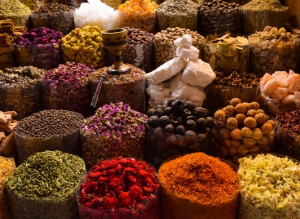What are the health benefits of spices?
Published Aug 26, 2023 • By Candice Salomé
Ginger, coriander, turmeric, cinnamon... As well as flavoring our dishes, spices help to reduce the amount of salt and sugar used in cooking. But that's not all: they also have numerous health benefits - antibacterial, anti-inflammatory, anti-bloating, etc.
So which spices should we use to address our health concerns? And how should we consume them?
We explain it all in our article!

Since ancient times, people have crossed oceans and continents in search of new spices for cooking and health care. Used throughout the world to preserve food and to season dishes, spices add flavor and color to our food. But did you know that they also have many health benefits?
Which spices should we use for which health problems?
Turmeric
Turmeric is a spice extracted from the rhizome of the Curcuma longa or Curcuma aromatica plant. It is grown mainly in India and Malaysia.
Turmeric has been used for thousands of years in Ayurvedic medicine (traditional Indian medicine). The WHO recognizes its effectiveness in the treatment of digestive disorders.
Thanks to one of its components, curcumin, turmeric is a powerful antioxidant and has anti-inflammatory properties.
Turmeric is used as a gastric stimulant to combat heartburn and reduce nausea. It is also used to relieve intestinal pain, gastritis, pancreatitis and rheumatoid arthritis.
Turmeric can also be beneficial for the skin, relieving eczema and psoriasis. Used in the form of a poultice, it can treat redness or plaques.
Cloves
Although research into the effects of cloves is still limited, its health benefits are numerous. Cloves have numerous analgesic, anti-inflammatory and antibacterial properties.
Cloves can be used to treat skin problems such as acne, but also toothache, allergies, arthritis, migraines, urinary tract infections, as well as certain hair and scalp conditions (dandruff, for example). It also relieves rheumatism and muscular pain, as well as stomach upsets such as bloating, and viral infections.
Nutmeg
Nutmeg can be used to relieve digestive symptoms and helps with problems as nausea, stomach ache, bloating and diarrhea. In addition, flatulence, constipation, stomach cramps and intestinal infections can also be reduced thanks to nutmeg. A true digestive spice, nutmeg encourages the flow of digestive juices and therefore limits intestinal problems.
Another interesting property of nutmeg is its ability to ease joint pain. Nutmeg butter can be applied to the skin on painful areas. Rich in essential oils, it loosens contractures and prevents cramps.
Saffron
Saffron has a reputation for soothing many ailments, including mood disorders, cramps, asthma, menstrual disorders, liver disease and toothache.
But its main application remains its beneficial role in mood disorders. Numerous studies attest to its effect on various mental health problems such as depression, low morale, insomnia, stress and anxiety. In fact, some of its constituent molecules - crocin and safranal - appear to be able to modulate levels of serotonin, one of the 'happiness hormones', produced by the brain.
Ginger
Ginger, like turmeric, is a rhizome, also recognized as a 'superfood'.
Ginger is a powerful antioxidant, protecting the body's cells from damage caused by free radicals. It works throughout the body, contributing to overall health and well-being. It is said to have many virtues; for example, it:
- aids digestion,
- reduces nausea and vomiting,
- has powerful anti-inflammatory properties,
- reduces fatigue,
- is good for the heart,
- reduces headaches and the onset of migraine.
Cardamom
Cardamom has many digestive properties. It acts on the entire digestive system, stimulating the bile, reducing bloating and flatulence, and relieving heartburn, as well as diarrhea, gastritis and constipation. Cardamom regulates intestinal flora thanks to its antimicrobial and antimycotic properties.
It also has powerful anti-inflammatory properties, and is an analgesic and antispasmodic, helping to combat muscle spasms and related pain.
Cardamom is rich in potassium, calcium and magnesium. These minerals are linked to the regulation of the cardiac system, control of the blood pressure and the proper transport of oxygen by red blood cells.
Caution: when consumed in excess, cardamom can cause minor side effects (nausea, headaches, etc.).
Cinnamon
Thanks to its antioxidant properties and high mineral and vitamin content, cinnamon helps boost the immune system and is ideal for treating certain winter ailments such as colds, coughs, flu, etc.
Cinnamon has anti-inflammatory, antibacterial, anti-viral, anti-parasitic and antiseptic properties. It can therefore be used to prevent and even treat infections and inflammation of the intestinal flora. It also stimulates gastric secretions.
How should these spices be consumed?
The secret to the effectiveness of spices lies in using them regularly. As a general rule, one teaspoon of spice is needed per portion, either as an infusion or as a seasoning, adjusted to suit individual tastes.
If spices are added to dishes, they bring out their flavor. The benefits are immediate, as they greatly reduce the need for salt (which we tend to consume in excess) and sugar, and limit the addition of fats such as cream or butter.
It's best to choose organic spices. Those that are not tend to contain too many pesticides because of the way they are prepared.
It is advisable to choose spices that are sold separately rather than blends. Similarly, prefer fresh or unground spices, as they can be stored better and are more nutritious. With a zester or a spice grater, you can easily incorporate them into your dishes or infusions!
Take care!
Sources :
Alimentation : quels sont les bienfaits des épices pour la santé ?, RTL
Les vertus secrètes des épices, Allo Docteurs
Les bienfaits des épices, Centre Hospitalier Calais
10 épices aux bienfaits santé validés par la science, Femme Actuelle
Épices : 12 bonnes raisons pour les consommer quotidiennement, Top Santé
Les épices : à consommer tous les jours !, 1Food1Me
Comments
You will also like

Spoon theory: What is it and how can it help people living with chronic illness?
Apr 13, 2022 • 7 comments

 Facebook
Facebook Twitter
Twitter

